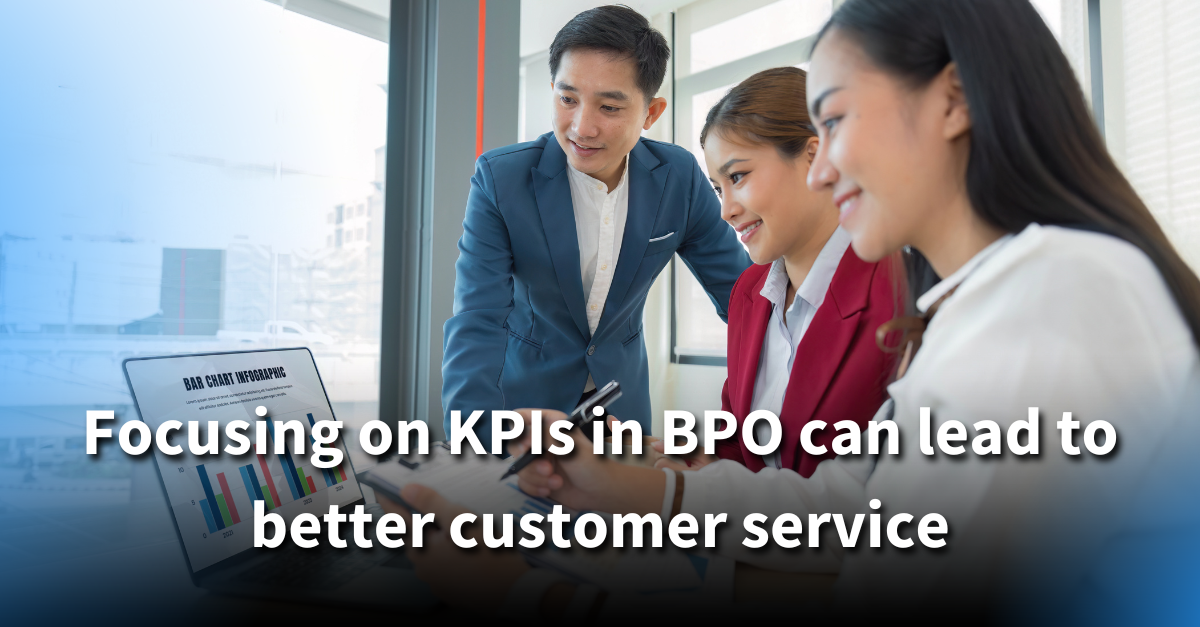Schedule a FREE call with our outsourcing expert now and get a precise quotation that meets your requirements. Don't wait - get started today!
In the competitive world of Business Process Outsourcing (BPO), understanding Key Performance Indicators (KPIs) is crucial for success. KPIs are specific metrics that help companies measure how well they are performing. Focusing on KPI in BPO can lead to better customer service, happier employees, and ultimately, more profit. Imagine achieving ten years of business success in just ten days! While that might sound incredible, it’s entirely possible with the right strategy. In this guide, we’ll explore how you can leverage KPI in BPO to reach new heights.
What is KPI in BPO?
KPI in BPO are measurable values that show how effectively a company is reaching its key business goals. They help assess various aspects of call center operations, including the performance of call center agents, the volume of calls handled, and customer satisfaction scores. By monitoring these KPIs, businesses can make informed decisions that can improve performance and efficiency.
Organizations that utilize KPIs effectively can improve their overall performance significantly. For instance, businesses can optimize their operations, streamline processes, and enhance customer experiences. The importance of having a solid KPI strategy in place cannot be overstated.
Why Are KPIs Important in BPO?
- Improved Customer Satisfaction (CSAT)
Customer satisfaction is a crucial KPI for any business. It reflects how well a company meets or exceeds customer expectations. High levels of customer satisfaction lead to repeat business and positive word-of-mouth, which are vital for growth. - Efficient Resource Management
Monitoring KPIs allows businesses to manage resources effectively. For example, understanding call volume helps companies allocate staff during peak hours. If a call center experiences a spike in call volume during lunch hours, more agents should be scheduled during that time to ensure that customer inquiries are handled promptly. - Enhanced Agent Performance
KPIs also provide insights into how well agents are performing. This data can be used to identify training needs and improve overall service quality. By focusing on agents’ performance, companies can ensure that their teams are equipped to handle customer inquiries effectively. - Data-Driven Decision Making
KPIs provide concrete data that can guide decision-making processes. With clear metrics, businesses can identify areas for improvement and allocate resources more effectively. This leads to better strategies that can significantly enhance operational efficiency. - Alignment with Business Goals
Having well-defined KPIs ensures that all team members understand the company’s goals and objectives. This alignment fosters a sense of accountability and motivates employees to work toward common objectives.
Key KPI in BPO to Monitor
To achieve significant success in BPO, consider focusing on the following KPIs:
- Call Volume
Call volume refers to the number of calls received by a call center within a specific timeframe. Monitoring call volume is essential for effective workforce management. Understanding peak call times allows companies to allocate resources efficiently. - Average Wait Time
Average wait time is a critical metric that influences customer satisfaction. Long wait times can frustrate customers and lead to negative experiences. Customers typically expect to be connected with a representative quickly, and reducing wait times can significantly improve customer satisfaction and retention rates. - Handle Times
Handle time refers to the total time an agent spends assisting a customer, including both talk time and follow-up actions. Monitoring handle times can help businesses identify bottlenecks in their processes. A shorter handle time is generally desirable, but it should not come at the expense of service quality. Balancing efficiency and quality is key to maintaining high customer satisfaction levels. - Customer Satisfaction (CSAT)
CSAT scores reflect customers’ experiences with the service provided. Regularly measuring CSAT allows companies to adapt their strategies based on customer feedback. A high CSAT score indicates that customers are satisfied with the service they received. Companies can use surveys or feedback forms to gather this data and make necessary improvements. - First Call Resolution (FCR)
FCR measures the percentage of customer inquiries resolved on the first contact. High FCR rates are indicative of effective service and can lead to increased customer satisfaction. If customers have to call multiple times for the same issue, their frustration levels increase, which can impact overall satisfaction. - Employee Satisfaction
Employee satisfaction is crucial for maintaining a motivated and engaged workforce. High employee satisfaction often correlates with better customer service. Regular surveys can help assess agent morale and identify areas where improvements can be made. Recognizing and rewarding high-performing agents can lead to increased motivation and retention. - Abandonment Rate
The abandonment rate measures the percentage of calls that are terminated by customers before reaching an agent. A high abandonment rate can indicate long wait times or inadequate staffing. By addressing the causes of abandonment, companies can improve customer retention and satisfaction. - Cost per Contact
Cost per contact measures the total cost incurred to handle a customer inquiry. Monitoring this KPI helps businesses identify areas where costs can be reduced without sacrificing service quality. It’s essential for budgeting and resource allocation.
Additional KPI in BPO for Consideration
While the above KPIs are essential, several other metrics can provide valuable insights into BPO operations:
- Net Promoter Score (NPS)
NPS gauges customer loyalty by asking customers how likely they are to recommend a company to others. A high NPS indicates a loyal customer base, while a low score may signal the need for improvement. Regularly measuring NPS can provide insights into customer perceptions and areas for enhancement. - Call Resolution Rates
This metric measures the percentage of calls resolved successfully by the agent without needing further follow-ups. High resolution rates indicate that agents are effective in handling inquiries, contributing to customer satisfaction and reducing overall operational costs. - Quality Scores
Quality scores assess the performance of call center agents based on predefined criteria, such as communication skills, problem-solving abilities, and adherence to protocols. Regular quality assessments help ensure that agents maintain high service standards. - Training Effectiveness
Monitoring the effectiveness of training programs can help companies determine if their training initiatives lead to improved agent performance. This metric can include assessments before and after training to measure knowledge retention and application. - Customer Retention Rate
This metric indicates the percentage of customers that remain loyal to the business over a specific period. A high retention rate suggests that customers are satisfied and willing to continue using the services offered.
How to Implement KPIs in Your BPO Strategy
Implementing a KPI strategy in your BPO operations requires careful planning and execution. Here’s a step-by-step guide to help you get started:
- Define Your Objectives
Begin by identifying the specific goals you want to achieve through KPI implementation. Whether it’s improving customer satisfaction or reducing wait times, having clear objectives will guide your strategy. - Select Relevant KPIs
Choose KPIs that align with your objectives. Focus on metrics that provide actionable insights into your operations. It’s essential to select KPIs that are easy to measure and directly impact your business goals. - Regular Monitoring
Consistently track and analyze your KPIs to assess progress. Use analytics tools to visualize data and identify trends over time. Regular monitoring helps you stay informed and allows for timely adjustments. - Engage Your Team
Involve your agents in the process. Share KPI results and encourage feedback to foster a culture of accountability and collaboration. When employees understand the importance of KPIs and how they contribute to overall success, they are more likely to be engaged and motivated. - Provide Training and Support
Offer training programs to help agents understand the importance of KPIs and how they can impact their performance. Providing ongoing support and resources can help employees feel confident in their roles and improve overall service quality. - Adapt and Optimize
Be prepared to adjust your strategies based on KPI results. Continuous improvement is essential for long-term success in the BPO industry. If certain KPIs are not meeting expectations, investigate the causes and make necessary changes. - Celebrate Successes
Recognize and celebrate achievements related to KPI improvements. Acknowledging hard work can boost morale and encourage continued focus on performance metrics. Create a culture where success is shared and celebrated.
Overcoming Challenges in KPI Implementation
While implementing KPIs can lead to significant benefits, businesses may face challenges along the way. Here are some common obstacles and how to overcome them:
- Resistance to Change
Employees may resist changes to established processes. To combat this, involve your team in discussions about KPI implementation. Explain the benefits and how KPIs can lead to improved service and job satisfaction. - Data Overload
With numerous KPIs available, it can be overwhelming to choose which ones to track. Start by focusing on a few key metrics that align with your business goals. As you become comfortable, you can gradually expand the range of KPIs monitored. - Inconsistent Measurement
Ensure that KPIs are consistently measured and reported. Develop standardized processes for data collection to avoid discrepancies. Regular audits of KPI data can help maintain accuracy. - Lack of Technology
Invest in the right technology to streamline KPI tracking and reporting. Customer relationship management (CRM) systems and analytics tools can provide valuable insights into performance metrics. This investment can yield significant returns in terms of efficiency and accuracy. - Training Gaps
Agents may lack the necessary training to understand how their performance impacts KPIs. Address this by providing comprehensive training that highlights the importance of KPIs and how agents can influence them. - Overemphasis on Numbers
While KPIs are important, overemphasizing them can lead to a culture of fear rather than motivation. Ensure that the focus is on improvement rather than punishment for underperformance.
Conclusion
KPIs are essential tools for measuring and optimizing performance in Business Process Outsourcing. By focusing on the right metrics, companies can enhance customer satisfaction, improve efficiency, and ultimately drive profitability. Implementing KPIs requires careful planning, ongoing monitoring, and a commitment to continuous improvement. With a strategic approach, businesses can unlock the full potential of their BPO operations and pave the way for long-term success.
Investing in effective KPI strategies can yield tremendous benefits, but it’s essential to tailor your approach to your organization’s unique needs. As your BPO operations grow and evolve, staying adaptable and responsive to change will be key.
With the right KPIs in place, you can not only survive in the competitive BPO landscape but also thrive, achieving your business goals faster than you ever imagined.
For businesses looking to explore the benefits of externalization offshore, partnering with a trusted provider like Magellan Solutions can make a significant difference. With expertise in offshore outsourcing services, Magellan Solutions can help your business enhance efficiency, reduce operational costs, and expand its global reach.
Unlock your business potential with us! Book your FREE 60-minute business consultation today, and let’s strategize how to elevate your operations—NO COMMITMENTS, just results-driven insights!
















